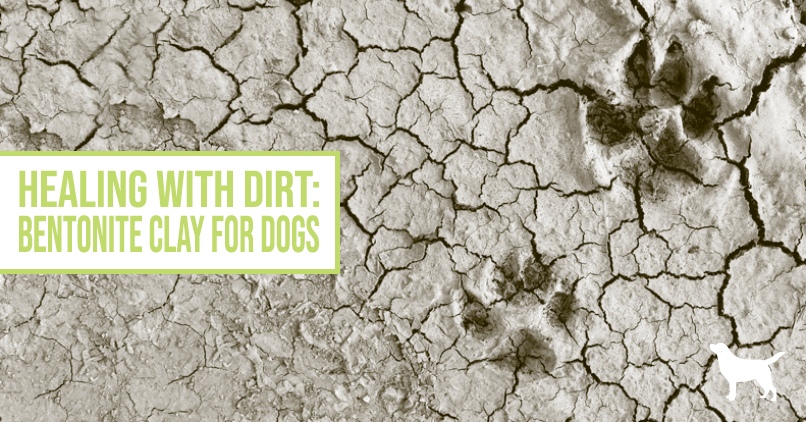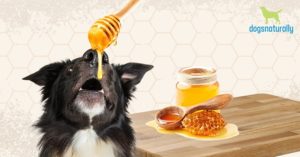Did you know that Bentonite clay for dogs has the ability to treat and prevent many health issues? Maybe your dog’s mud baths aren’t so terrible after all.
Seems crazy right? That a clay just may be the answer to your dog’s health struggles … but it’s true!
Science continues to prove that this ancient remedy has many healing properties. And now you can find it added to conventional treatment plans too.
So if you haven’t been using this great supplement for your dog yet, I want to share with you why you need to. But first let’s talk about where this magical clay comes from.
What is Bentonite Clay?
Bentonite clay is a very old and trusted ancient remedy. Healers have used it to treat many ailments over the years including :
- Digestive issues
- Skin diseases
- Immune support
- Parasites
Bentonite clay is an absorbent aluminum phyllosilicate clay. One of the largest sources is found in Fort Benton, Wyoming, which is how got the name Bentonite.
You may have heard of Montmorillonite clay and wonder what the difference is. They are very similar and both clays are part of the Smectites clay family. This is why some products and companies will use the two names interchangeably.
Montmorillonite was named after the French region it was discovered in, Montmorillon. Its green color comes from the algae that come from the dried-up sea beds of the Mediterranean.
Their absorption capacity is as much as 8 times greater than other clays. And they mix well with water to form a paste you can use externally and internally for healing.
So let’s jump into some of the top ways you can use it to help your dog be at her best.
Top Reasons To Use Bentonite Clay For Dogs
Detoxify For Better Health
Bentonite clay is well known for its ability to detoxify the body. This is due to its polycationic nature. Which simply means it acts like a magnet for positively charged particles.
This makes Bentonite clay a super magnet to absorb positively charged toxins … so it’s highly effective at removing heavy metals and chemicals from the body.
You may see Bentonite added to some commercial animal foods. And this should be a red flag for you. This is because it’s added to help protect against toxins such as molds. Aflatoxins are one of the main mold chemicals to worry about. They are very toxic to the liver and are known to lead to cancer. In 1989 a study found that Bentonite clay was able to reduce aflatoxin contamination in water by 34% on its own. And another study reviewed its support for pigs fed corn contaminated with aflatoxins.
They found that Bentonite clay was able to restore liver function. And it didn’t affect their digestion of good nutrients.
RELATED: Cancer-causing aflatoxins found in dog foods …
Support For Dogs With Kidney Disease
In addition to toxins and metals, this clay is also great for helping the body remove organ toxin wastes. These can build up when organs start to decline and age.
One example is its ability to support kidney disease. It’s a safe, natural phosphate binder choice if your dog has kidney disease.
But make sure you check with your holistic vet before using Bentonite clay for your dog, because her dose will be unique to her case. Bentonite may not be suitable depending on what other herbs or medications she is currently taking.
Most commercially available phosphate binders are contaminated with aluminum and other chemicals.
When your dog’s kidneys lose their ability to clear toxins they build up in her bloodstream. And this is one of the reasons why she feels so sick and nauseous. The excess phosphates that the kidneys can’t clear, and the ones in her food get absorbed by the clay. This will help her to feel much better and can greatly improve her appetite and energy level.
Treat And Prevent Parasites
Bentonite clay works in similar ways to diatomaceous earth (DE) for parasites. But it’s less abrasive when taken orally than DE. You just have to remember to give your dog extra water as it will absorb a lot of water from her gut.
This is how it helps clear intestinal parasites. It dehydrates them and binds them to be removed in her stool.
Using Bentonite clay topically as a flea dust or a soak also works for flea prevention. I’ll cover a soak plan shortly.
Dusting it on the skin will dehydrate the fleas over a short period of time. And its microscopic sharp edges can cut through their hard exoskeletons too.
RELATED: Our Best Home Remedies For Fleass …
Improve Immune Function And Gut Health
Feeding Bentonite clay helps with detoxification but it also provides many trace minerals. And these trace minerals are often missing in diets. Even raw and fresh diets can be missing them. This is because so much of our soil is becoming depleted of these minerals. Which means the vegetables that grow in them, and animals who graze on them are also deficient.
These minerals are easily absorbed by the gut even if your dog has some digestive issues. And it supports the beneficial bacteria in her gut to improve digestion and immune strength. That’s because 90% of her immune system comes from her gut. So balancing the good bugs and the bad bugs is important. This gives her the strength to fight against bacteria, viruses, and toxins.
And Bentonite clay is great at binding to pathogenic bacteria in the gut … making it a win-win for the gut by removing pathogenic bacteria and boosting the good bacteria. Its super absorbency is to thank for this. That’s also one of the reasons it’s able to clear up episodes of vomiting and diarrhea quickly all on its own.
Just make sure to offer your dog plenty of water as it can cause dehydration and constipation.
To be safe, offer the clay as a moist paste and start with a low dose for mild cases of diarrhea.
RELATED: Probiotics: when they help, when they harm …
Relief For Skin Disease And Allergies
Bentonite clay helps both internally and externally to provide skin and allergy relief.
Internally it helps by removing toxins, parasites and bacterial overgrowth from her gut, helping her immune system remain strong and balanced to fight off these threats.
But you can also use it topically to soothe skin irritations and bug bites. And in humans, it’s effective at preventing and soothing poison ivy an poison oak dermatitis.
Bentonite clay also has natural antibiotic properties. This is useful if she has a bacterial overgrown on her skin. A study found that it can be effective against superbugs like MRSA (methicillin-resistant S. aureus). Pretty impressive when there are currently many antibiotics that no longer can treat these superbugs.
DIY Bentonite Clay Healing Paste
- Mix 1 part clay with two parts of filtered or spring water.
- Mix well to form a paste to use topically.
- Apply the paste to irritated skin.
This paste is very soothing and great at drawing toxins out of the skin. And it’s also safe if your dog licks it. But remember if you’re also giving it internally, you may want to lower your dose. Too much bentonite clay can cause constipation.
Bonus: This paste also works as a pet-friendly toothpaste!
DIY Soothing Bentonite Clay Bath Soak
This one is great if your dog loves baths. And it’s ideal if she is itchy all around or has many areas of irritated skin.
- Make a Bentonite clay bath for her to soak in for 10-20 minutes.
- Use 1/2 -1 cup of clay in a full tub.
Cancer Care
There isn’t a lot of research yet on how Bentonite clay affects cancer cells … but we know that supporting your dog’s immune system is a great start.
By adding Bentonite clay into her diet you will help reduce her risk of cancers. Because you’ll be able to clear her body of heavy metals and toxins on a regular basis. So she’ll be at less risk of developing chronic inflammation and cell damage in her body.
And one study is showing promise that it may have the ability to slow the growth of certain brain and lung cancer cells. These cancers are aggressive and spread fast.
RELATED: A holistic approach to cancer …
Giving Bentonite Clay Orally To Dogs
There are a few commercial products now for dogs. This makes it easy to dose at home as you can follow the manufacturer’s directions for your dog’s weight.
If you source Bentonite clay on its own, give 1/4 – 1/2 tsp daily mixed with a small amount of filtered water.














